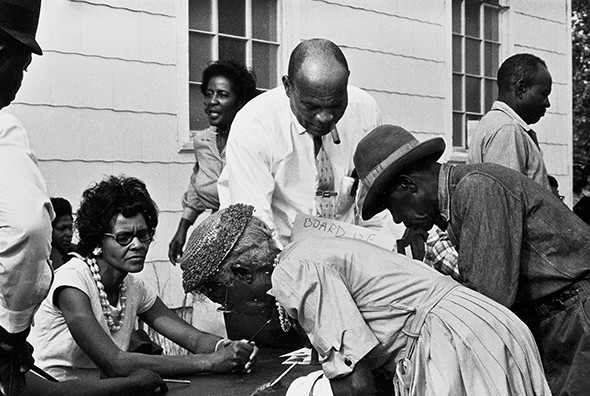Website Details Voting Rights Struggle Before, After Selma
A new website tells the story of the fight for voting rights

A new web resource dedicated to telling the story of the grassroots fight for voting rights will launch March 2.
The website, One Person, One Vote: The Legacy of SNCC and the Fight for Voting Rights goes live one week before the anniversary of “Bloody Sunday,” March 7, 1965, when state troopers attacked the peaceful voting rights march of 600 local demonstrators on Selma’s Edmund Pettus Bridge. It tells the side of the story largely invisible to the general public: the key role of local leaders and the Student Nonviolent Coordinating Committee in shifting the national political agenda toward voting rights.
Students and faculty at Duke University worked with SNCC veterans and civil rights scholars from around the country on the website, which documents how the bottom-up strategies of young people and black community leaders across the Deep South created an expansion of political, social, and economic opportunity for all citizens in the 1960s.
“This site not only begins to tell a story largely ignored by civil rights canon, but also pilots a way to meaningfully bring Movement participants and scholars together for that purpose,” said Courtland Cox, Chair of the SNCC Legacy Project.
The website focuses on SNCC’s organizing campaign in three states: Mississippi, Alabama, and Georgia. It draws on oral histories, as well as primary documents, photographs, and audiovisual materials at Duke and other repositories across the country. It includes profiles of 75 unheralded activists, movement elders and community leaders–along with primary documents and video.
A timeline walks visitors through significant events in SNCC’s history. An interactive map brings to life the landscape of the many places where the young people of SNCC organized.
SNCC was founded at Shaw University in Raleigh in 1960 by student sit-in leaders, primarily from southern black campuses. Its organizing and voting rights work began in 1961 in Mississippi and Georgia, focusing on political empowerment and equal economic opportunity. Full-time student workers, known as “field secretaries,” worked with communities to train and organize new local leaders – even as they were nurtured and guided by the older activists. SNCC developed philosophical and organizational models still in use today across the world.
The One Person, One Vote website is part of a longer-term collaboration among the SNCC Legacy Project, Duke’s Center for Documentary Studies, and the Duke University Libraries. This will be the first time SNCC veterans have engaged with the academic community in such a sustained effort, with the goal of getting their crucial insights into the nation’s formal histories and archives and, beyond that, to young activist communities.
“This is an enormous achievement, to find ways to bring these experts who were so central to the voting rights struggle, into the formal historical record through their own words and on their own terms,” said Wesley Hogan, director of Duke’s Center for Documentary Studies. “The project comes at a moment when our nation is both commemorating key victories of the civil rights movement and seeing those victories challenged by new restrictive voting laws in many states.”
A website launch event entitled “The Activists’ Playbook: From SNCC to Selma to the New Civil Rights Movement,” will take place Wednesday, March 4, at 7:00 p.m. at the Main Branch of the Durham County Library at 300 N. Roxboro Street. The event will include a panel discussion with SNCC veterans Judy Richardson and Charlie Cobb, local activist Cynthia Brown, and two young Durham activists. Like the One Person, One Vote site, the panel will focus on grassroots organizing and bottom-up history. A reception will follow.
